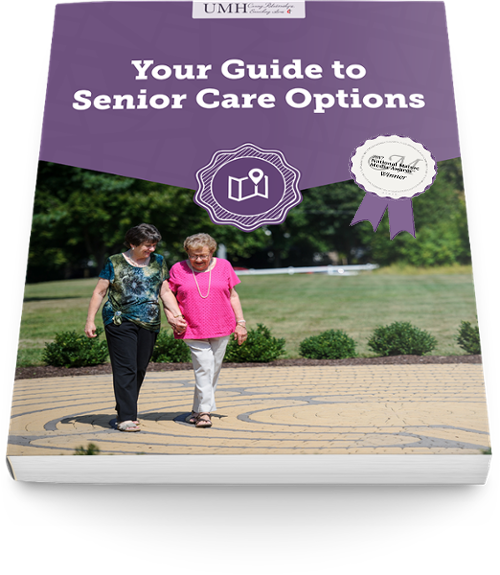+1 (877) 929-5321
+1 (877) 929-5321
Happily Ever Aging
...a UMH Senior Living Blog
Everything you need to know about caring for your loved one - at home or at a senior living community.
Aging & Caregiving | Valentines Day | aging seniors | assisted living | caregiver | senior caregiving | tips for caregivers
Valentine's Day is a holiday for couples. This holiday can be very painful when a loved one doesn’t have their husband or wife by their side. For your widowed mom or dad, they could be experiencing this pain. Watching others celebrate with their spouses can trigger deep sadness, and even depression, in your aging loved one.
Share
Aging & Caregiving | assisted living | tips for caregivers
Although doctors don’t always tell us what we want to hear, their knowledge, education and training mandates that we listen to them.
Share

Get the award-winning guide and subscribe to our blog.
Aging & Caregiving | activities for seniors | assisted living | tips for caregivers
Hobbies are an excellent way to support the mind and body while staying active, connecting with others, and finding a sense of fulfillment -- all experiences which often diminish with age. Inspire your aging loved one with these five ideas designed to help him/her put down the remote control and pick up a rewarding new hobby.
Share
60-day stay trial | Aging & Caregiving | aging parents | assisted living | tips for caregivers
Just because you are far away from your loved one doesn’t mean you can’t play a valuable role in his/her life.
Share
Aging & Caregiving | assisted living | health tips for seniors | tips for caregivers
While eating right at any time of the year is challenging, doing so during the holidays can feel downright impossible. However, with some advance planning and a commitment to limiting sugar, salt and fat during your holiday meal preparation, you can help your family members -- including your aging loved one -- sail through the season and start the new year off right.
Share
Aging & Caregiving | assisted living | tips for caregivers
You may not have heard of the “Sandwich Generation,” but if you’re reading this post there’s a large chance you’re a part of it. The term refers to middle-aged Americans who are “sandwiched” between caring for their aging parents and their own young children. In fact, nearly 50 percent of adults between the ages of 35 and 55 fall into this category with 15 percent providing financial support at both ends. Caused by a “perfect storm” of an aging population, increased life expectancy and the challenges of financial independence facing today’s young adults, the trend is expected to continue.
Share
60-day stay trial | Aging & Caregiving | aging parents | assisted living | caregiver | end of life issues | tips for caregivers
By Jim Stinson, Director of Spiritual Life
Share
Aging & Caregiving | Balancing life | aging parents | assisted living | caregiver tips | caring for aging parents | tips for caregivers
Balancing the responsibilities of work, finances, family life, and caring for an aging loved one can leave many caregivers feeling stressed and in need of support. It is no secret that finding balance in one’s life can be difficult if you are coordinating care for a loved one. Driving to doctor’s appointments, filling prescriptions, planning and preparing meals, and assisting with household chores are only some of the many items on any caregiver’s to-do list.
Share
60-day stay trial | Aging & Caregiving | assisted living | caregiver information | caregiver tips | senior caregiving information | tips for caregivers
You become a better caregiver by making your loved one’s day a little brighter--a little lighter and a lot happier each time you care for them. And it’s the simple things that are often the most appreciated. If you can “make their day,” you often unknowingly become a better caregiver. Here are six care-giving tips that will surely help to brighten your loved one’s day:
Share
60-day stay trial | Aging & Caregiving | assisted living | assisted living ct | senior living | senior living community | tips for caregivers
As a caregiver and child of aging parents, one of the most difficult things you must do is confront the fact that at some point you will need to have “the talk” with your loved one about their future. This is a challenging time for you and your parents as you both begin to acknowledge and discuss their diminishing abilities. Your parents are probably aware of their physical and cognitive changes and they may be anxious and reluctant to speak with you. Here are five steps to help you make sense of the changes and work with your parents to plan for the future:
Share